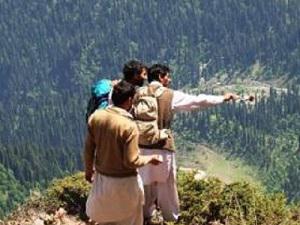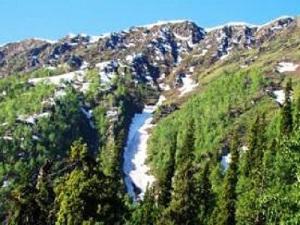Baseer ud din Qureshi
Other projects
The project aims to conserve the Himalayan musk deer (Moschus chrysogaster) in Arung Kel area through research, awareness education and capacity building of the field staff of Department of Fisheries and wildlife Azad Jammu and Kashmir.

Team members pointing Musk deer during the survey.
According to IUCN red list Himalayan musk deer (Moschus chrysogaster) is endangered with decreasing population. In Asia, it is distributed in Afghanistan, Bhutan, China, India, Myanmar, Pakistan and Nepal. In Pakistan Neelum Valley, Jehlum Valley, Pallas valley and peripheral area of Deosai plains is the habitat of musk deer. Here it inhabits in sub alpine birch (Betula utilis) forest and mixed coniferous forest. It is the smallest ungulate at the Northern slopes with the ability to survive in harsh cold climatic conditions.

Birch (Betula utilis) forest, potential habitat of Musk deer in Arang Kel area.
Musk deer is killed for the collection of natural musk which is found in the musk gland of mature males near the umbilicus. During illegal killing for every mature male, 4 – 5 females and juveniles are killed which have no musk or very small amount of musk. This activity results in the rapid decline of population of musk deer. In the project area local community lives very close to the vicinity of musk deer. So it is easy for them to exploit the population of musk deer. The price of musk is higher then gold which attract the illegal hunters and musk gatherers. Local people live at subsistence level that is why they use the musk as a source of income. Other factors like deforestation, overgrazing and global warming are also responsible to decrease the population of musk deer. Illegal killing of musk deer results the fragmented population of this species.
Through this project, efforts will be made to conserve the population of musk deer in Arung Kel area. The target will be achieved through Conservation based awareness to local community, school going children and college students. Capacity of the field staff of Department of Fisheries and Wildlife Azad Jammu and Kashmir will be build by improving their knowledge about survey techniques, data collection and recent issues in wildlife conservation. Data will be collected on the population density, distribution, habitat use and threats to musk deer in the project area. Collected information will be analysed to assess the current population status and threats to Musk deer in the study area. Results will be shared with local community to mobilize them for the conservation of wildlife especially musk deer.